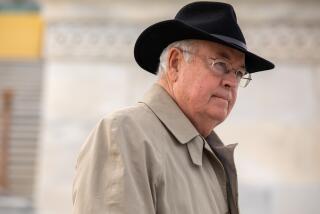Lindsey Won’t Face Charge in Whitewater
- Share via
WASHINGTON — Whitewater independent counsel Kenneth W. Starr indicated Friday night that he will not seek an indictment against White House counsel Bruce Lindsey on charges related to the handling of get-out-the-vote funds for President Clinton’s 1990 campaign for Arkansas governor.
Starr’s brief statement was greeted as welcome news by Lindsey, who has consistently maintained that he had done nothing wrong in his role as treasurer of the 1990 campaign. His attorney, Allen R. Snyder, described Lindsey as “gratified.”
Although Starr did not state explicitly that he has ruled out bringing other charges against Lindsey, there is no indication that the independent counsel has developed evidence linking the White House aide to any crime.
Starr’s statement was unusually cryptic and did not even mention Lindsey’s name. It simply said that no indictment would be forthcoming on or before May 25--the date when the statute of limitations expires on the charge related to Lindsey.
Before issuing the statement, sources said, Starr’s office privately notified Lindsey’s attorney that the independent counsel would not bring charges against the White House official related to the get-out-the-vote money.
Lindsey, a close friend and political confidant of President Clinton, had been notified in Feburary that that he was a “target” of the government’s Whitewater investigation and could be indicted for improperly handling the bank accounts of Clinton’s 1990 gubernatorial campaign.
If indicted, Lindsey would have been the highest-ranking current Administration official ensnared in the lengthy, wide-ranging investigation that began with allegations aimed primarily at Clinton and his wife, First Lady Hillary Rodham Clinton.
Lindsey has been implicated by a former official of the Perry County Bank in Arkansas in the bank’s failure to notify the Internal Revenue Service of a withdrawal by Clinton’s 1990 gubernatorial campaign. By law, the IRS must be notified of any withdrawal in excess of $10,000.
Lindsey, who was treasurer of Clinton’s gubernatorial campaign, has admitted that he withdrew $30,000 from the bank with four separate checks, each less than $10,000, on May 25, 1990, shortly before the primary election. But he had denied that he instructed the bank not to comply with the law requiring notification.
Starr’s case against Lindsey is said to rest primarily on the testimony of Neal T. Ainley, former president of the Perry County Bank. Ainley pleaded guilty recently to charges of concealing from the IRS withdrawals totaling $52,500 by Clinton’s gubernatorial campaign 1990.
Ainley acknowledged conspiring with other unnamed persons to conceal the withdrawals.
Perry County Bank loaned $180,000 to the Clinton campaign during 1990. The transactions in question: $30,000 withdrawn on May 25, before the primary election, and $22,500 withdrawn on Nov. 2, before the general election.
According to sources, the money at issue in the investigation of Lindsey was distributed to leading members of Arkansas’ African American community by a man named Carol Willis, whose work on Clinton’s gubernatorial campaign earned him a position at the Democratic National Committee.
At the time of the 1990 election, the Perry County Bank was run by longtime Clinton supporter Herbert Branscum, who was appointed state highway commissioner after Clinton’s reelection as governor in 1990. Another bank official, Robert Hill, was later appointed by Clinton to the state banking board.
Sources said that Branscum and Hill told Starr they knew nothing of Ainley’s allegations that he was acting on orders from bank officials when he failed to inform the IRS of the Clinton campaign transactions.
Clinton spent $2.8 million on his reelection in 1990 and carried a debt of more than $100,000 until shortly before he was elected President in 1992. While still in debt, the campaign shifted $35,000 of its borrowed money into a special account that Clinton continues to use for special political activities in Arkansas.
His critics claim that the fund was created illegally since he had not paid off his debts.
More to Read
Get the L.A. Times Politics newsletter
Deeply reported insights into legislation, politics and policy from Sacramento, Washington and beyond. In your inbox twice per week.
You may occasionally receive promotional content from the Los Angeles Times.










